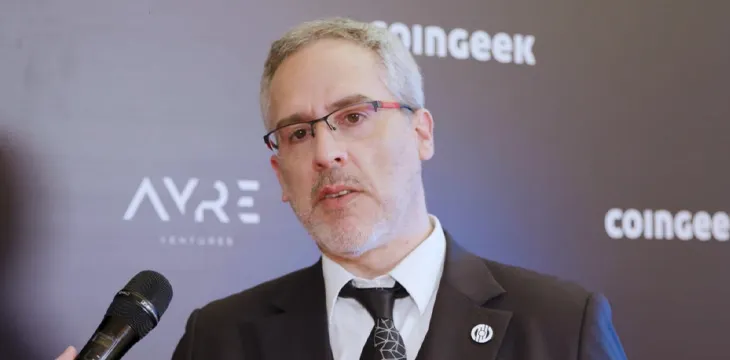|
Getting your Trinity Audio player ready...
|
https://www.youtube.com/watch?v=Jx-zwLg4K60
The metaverse is the biggest buzzword in technology today, eclipsing NFTs, which enjoyed the limelight in 2021. Facebook changing its name to reflect its shift in focus to this new technology is all the evidence you need for just how big the metaverse is. Robert Rice, however, believes that most companies seemingly in the lead will be gone in a few years, and only those that build a metaverse that impacts people’s real lives will survive.
Rice is the founder of Transmira, the company behind the experiential reality (XR) platform Omniscape. CoinGeek Backstage host Jon Southurst caught up with him in Dubai on the sidelines of the BSV Global Blockchain Convention, where he was one of the biggest stars.
“The metaverse is really exciting right now,” he noted, adding that his team’s approach sets them apart as they focus on marrying the metaverse with the real world.
People don’t want another VR game, he added. “We want the Matrix, something that’s going to impact the real world and our real lives.”
Today, it’s almost impossible to talk about the metaverse without mentioning Facebook, now Meta (NASDAQ: META), and Mark Zuckerberg’s attempt to monopolize this technology as he has with social media. Rice, however, believes that Zuck’s approach is wrong. Rather than trying to migrate small aspects of the current technology to the metaverse, he believes we must rethink the entire technology and build afresh.
“You’ve got a lot of smart people that are still thinking in old ways,” Rice pointed out.
While he gives some of the most captivating presentations, Rice has been known to introduce new features during every other CoinGeek Conference. This time, he didn’t, and as he told CoinGeek Backstage, this is because his team has been fully focused on giving users a seamless transition between its AR features and VR features.
The ‘Snow Crash’ metaverse will be here in five years
For most people, the metaverse is a futuristic concept. Not for Rice. He believes that we will be living in a ‘Snow Crash’ kind of metaverse in three to five years.
Snow Crash is the famous 1992 sci-fi novel by author Neal Stephenson which coined the term “metaverse,” referring to a VR kind of successor to the Internet as we know it today. In the novel, people use their digital avatars to explore the virtual world and interact with each other. However, for them, the VR world was mainly an escape from a dystopian world where the global economy had collapsed.
However, the metaverse for Rice will not be as bleak as the one predicted three decades ago.
“I think the technology is there for it, mostly now, but there’s not a lot of the tools for it, the interfaces. The tech is there but the wrappings for it aren’t quite there,” Rice said.
The transition into this digital world could be much faster if it weren’t for those in the lead taking the wrong direction, Rice believes, pointing specifically at Meta. Even with an idea like Horizon Worlds, its VR game which is expanding into a VR workspace, the company has still managed to come out with egg on its face.
“They haven’t really got [their mindset] out of Web 1 and Web 2,” he said.
Rice revealed that there had been two defining events that have thrust the metaverse onto the limelight—Facebook changing its name to Meta and the pandemic, with the latter forcing people to explore innovative uses of technology to compensate for the lost physical interaction.
“These were the two events that shaved ten years off the timeline. And now, there this huge momentum, like a tidal wave has been building,” Rice remarked.
And while Meta is the biggest name in the industry today, Rice believes that it won’t last another two-three years, at least not as a metaverse company.
Watch: The BSV Global Blockchain Convention presentation, Masters of the Metaverse
https://www.youtube.com/watch?v=hAV2jEP4nJs

 07-12-2025
07-12-2025 





